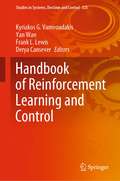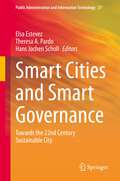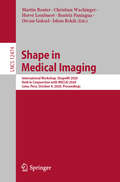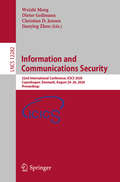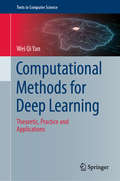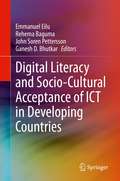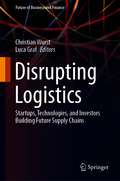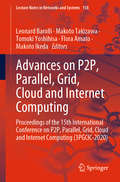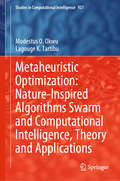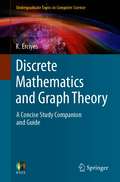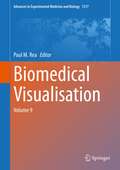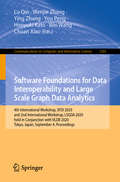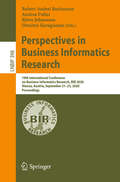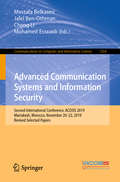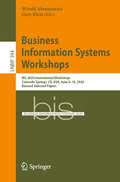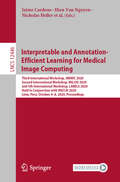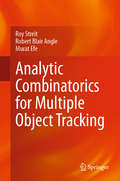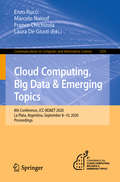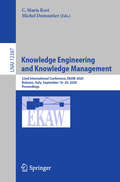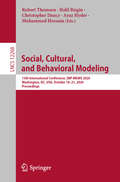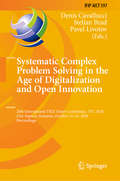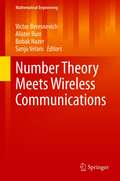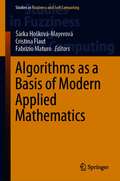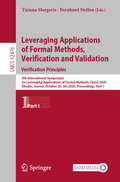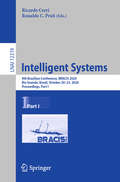- Table View
- List View
Handbook of Reinforcement Learning and Control (Studies in Systems, Decision and Control #325)
by Kyriakos G. Vamvoudakis Yan Wan Frank L. Lewis Derya CanseverThis handbook presents state-of-the-art research in reinforcement learning, focusing on its applications in the control and game theory of dynamic systems and future directions for related research and technology.The contributions gathered in this book deal with challenges faced when using learning and adaptation methods to solve academic and industrial problems, such as optimization in dynamic environments with single and multiple agents, convergence and performance analysis, and online implementation. They explore means by which these difficulties can be solved, and cover a wide range of related topics including:deep learning;artificial intelligence;applications of game theory;mixed modality learning; andmulti-agent reinforcement learning.Practicing engineers and scholars in the field of machine learning, game theory, and autonomous control will find the Handbook of Reinforcement Learning and Control to be thought-provoking, instructive and informative.
Smart Cities and Smart Governance: Towards the 22nd Century Sustainable City (Public Administration and Information Technology #37)
by Theresa A. Pardo Hans Jochen Scholl Elsa EstevezThis edited volume discusses smart cities and smart governance within the framework of the 22nd century sustainable city. Written by members of the Smart Cities Smart Government Research Practice Consortium (SCSGRPC), an international multidisciplinary consortium of researchers and practitioners devoted to studying smart governance, this book provides a foundation for global efforts to envision and prepare for the next generation city by advancing understanding of the nature of and need for novel policies, new administrative practices, and enabling technologies required to advance urban governance, governments, and infrastructure. The chapters focus on practical models and approaches, theoretical frameworks, policy models, emerging issues, questions and research problems, as well as including case studies from different parts of the world. A valuable addition to the body of knowledge on smartness in urban government, this book will be of use to researchers in the fields of public administration, political science, information science, and information systems, as well as policy makers and government officials working on implementing smart technology in their cities.
Shape in Medical Imaging: International Workshop, ShapeMI 2020, Held in Conjunction with MICCAI 2020, Lima, Peru, October 4, 2020, Proceedings (Lecture Notes in Computer Science #12474)
by Martin Reuter Christian Wachinger Hervé Lombaert Beatriz Paniagua Orcun Goksel Islem RekikThis book constitutes the proceedings of the International Workshop on Shape in Medical Imaging, ShapeMI 2020, which was held in conjunction with the 23rd International Conference on Medical Image Computing and Computer Assistend Intervention, MICCAI 2020, in October 2020. The conference was planned to take place in Lima, Peru, but changed to a virtual format due to the COVID-19 pandemic. The 12 full papers included in this volume were carefully reviewed and selected from 18 submissions. They were organized in topical sections named: methods; learning; and applications.
Information and Communications Security: 22nd International Conference, ICICS 2020, Copenhagen, Denmark, August 24–26, 2020, Proceedings (Lecture Notes in Computer Science #12282)
by Weizhi Meng Dieter Gollmann Christian D. Jensen Jianying ZhouThis book constitutes the refereed proceedings of the 22nd International Conference on Information and Communications Security, ICICS 2020, held in Copenhagen, Denmark*, in August 2020. The 33 revised full papers were carefully selected from 139 submissions. The papers focus in topics about computer and communication security, and are organized in topics of security and cryptography.*The conference was held virtually due to the COVID-19 pandemic.
Computational Methods for Deep Learning: Theoretic, Practice and Applications (Texts in Computer Science)
by Wei Qi YanIntegrating concepts from deep learning, machine learning, and artificial neural networks, this highly unique textbook presents content progressively from easy to more complex, orienting its content about knowledge transfer from the viewpoint of machine intelligence. It adopts the methodology from graphical theory, mathematical models, and algorithmic implementation, as well as covers datasets preparation, programming, results analysis and evaluations.Beginning with a grounding about artificial neural networks with neurons and the activation functions, the work then explains the mechanism of deep learning using advanced mathematics. In particular, it emphasizes how to use TensorFlow and the latest MATLAB deep-learning toolboxes for implementing deep learning algorithms.As a prerequisite, readers should have a solid understanding especially of mathematical analysis, linear algebra, numerical analysis, optimizations, differential geometry, manifold, and information theory, as well as basic algebra, functional analysis, and graphical models. This computational knowledge will assist in comprehending the subject matter not only of this text/reference, but also in relevant deep learning journal articles and conference papers.This textbook/guide is aimed at Computer Science research students and engineers, as well as scientists interested in deep learning for theoretic research and analysis. More generally, this book is also helpful for those researchers who are interested in machine intelligence, pattern analysis, natural language processing, and machine vision.Dr. Wei Qi Yan is an Associate Professor in the Department of Computer Science at Auckland University of Technology, New Zealand. His other publications include the Springer title, Visual Cryptography for Image Processing and Security.
Digital Literacy and Socio-Cultural Acceptance of ICT in Developing Countries
by Emmanuel Eilu Rehema Baguma John Soren Pettersson Ganesh D. BhutkarThis book discusses the role of human computer interaction (HCI) design in fostering digital literacy and promoting socio-cultural acceptance and usage of the latest ICT innovations in developing countries. The book presents techniques, theories, case studies, and methodologies in HCI design approaches that have been used to foster digital literacy, break the socio-cultural barriers to ICT adoption, and promote the widespread usage of the latest innovations in the health, agriculture, economic, education and social sectors in developing countries. The authors provide insights on how crossing disciplines in HCI such as usability design, user centered design, user experience, anticipated user experience, technology acceptance design, persuasive design, philosophical designs, motivational design, social-cultural oriented designs, and other HCI design approaches have promoted digital literacy and stimulated socio-cultural acceptance and the usage of the latest ICT innovations. The book is relevant in academic, industry and government.Presents theoretical, practical, and socio-cultural approaches to digital literacy challenges in developing countries;Discusses recent ICT and HCI innovations used to transform the health, agriculture, economic, education and social sectors in developing countries;Provides insights on design opportunities and challenges presented in countries where digital literacy is very low and with complex socio-cultural dynamics.
Disrupting Logistics: Startups, Technologies, and Investors Building Future Supply Chains (Future of Business and Finance)
by Christian Wurst Luca GrafThis book presents trends, developments, and examples of how digital disruption is currently reshaping the logistics industry. Logistics is the invisible force behind the global economy, influencing and providing a lens into all economic activities. Chapters written by respected experts in the field describe how new technologies such as autonomous vehicles, blockchain, Internet of things (IoT), and state-of-the-art freight management solutions are fundamentally changing supply chain solutions. Special emphasis is placed on promising start-ups and venture capital firms around the world that are now investing in the future of logistics."Supply chains hold significant room for optimization to the benefit of customers, industry participants, authorities and the environment. This book provides a unique set of perspectives from industry leaders covering a wide range of topics. It is a ‘must read’ for anyone seeking to understand and contribute to a better tomorrow in supply chains logistics." — Thomas Bagge, Chief Executive Officer and Statutory Director DCSA“The need for standardisation and digitalisation in logistics is no longer an option. This book gives insights from industry experts, shows trends and innovations in platforms, underlines the need for transparency and how big data and analytics can make a world of difference. It’s an incredible resource if you wish to better understand the new normal of logistics.” — Global Chief Digital & Information Officer, MSC Mediterranean Shipping Company"This book presents readers with a straightforward and comprehensive assessment of supply chain innovation and trends and their impact on the industry. With contributions from several industry leaders, it provides critical knowledge and insight that supply chain and logistics managers need to implement disruptive technologies strategically.” — Rene Jacquat, Founder / Advisor, LogiChain Solutions
Advances on P2P, Parallel, Grid, Cloud and Internet Computing: Proceedings of the 15th International Conference on P2P, Parallel, Grid, Cloud and Internet Computing (3PGCIC-2020) (Lecture Notes in Networks and Systems #158)
by Leonard Barolli Makoto Takizawa Tomoki Yoshihisa Flora Amato Makoto IkedaThis book aims to provide the latest research findings, innovative research results, methods and development techniques from both theoretical and practical perspectives related to P2P, Grid, Cloud and Internet computing as well as to reveal synergies among such large-scale computing paradigms. P2P, Grid, Cloud and Internet computing technologies have been very fast established as breakthrough paradigms for solving complex problems by enabling aggregation and sharing of an increasing variety of distributed computational resources at large scale. Grid Computing originated as a paradigm for high-performance computing, as an alternative to expensive supercomputers through different forms of large-scale distributed computing. P2P Computing emerged as a new paradigm after client–server and web-based computing and has shown useful to the development of social networking, B2B (Business to Business), B2C (Business to Consumer), B2G (Business to Government), B2E (Business to Employee), and so on. Cloud Computing has been defined as a “computing paradigm where the boundaries of computing are determined by economic rationale rather than technical limits”. Cloud computing has fast become the computing paradigm with applicability and adoption in all application domains and providing utility computing at large scale. Finally, Internet Computing is the basis of any large-scale distributed computing paradigms; it has very fast developed into a vast area of flourishing field with enormous impact on today’s information societies serving thus as a universal platform comprising a large variety of computing forms such as Grid, P2P, Cloud and Mobile computing.
Metaheuristic Optimization: Nature-Inspired Algorithms Swarm and Computational Intelligence, Theory and Applications (Studies in Computational Intelligence #927)
by Modestus O. Okwu Lagouge K. TartibuThis book exemplifies how algorithms are developed by mimicking nature. Classical techniques for solving day-to-day problems is time-consuming and cannot address complex problems. Metaheuristic algorithms are nature-inspired optimization techniques for solving real-life complex problems. This book emphasizes the social behaviour of insects, animals and other natural entities, in terms of converging power and benefits. Major nature-inspired algorithms discussed in this book include the bee colony algorithm, ant colony algorithm, grey wolf optimization algorithm, whale optimization algorithm, firefly algorithm, bat algorithm, ant lion optimization algorithm, grasshopper optimization algorithm, butterfly optimization algorithm and others. The algorithms have been arranged in chapters to help readers gain better insight into nature-inspired systems and swarm intelligence. All the MATLAB codes have been provided in the appendices of the book to enable readers practice how to solve examples included in all sections. This book is for experts in Engineering and Applied Sciences, Natural and Formal Sciences, Economics, Humanities and Social Sciences.
Discrete Mathematics and Graph Theory: A Concise Study Companion and Guide (Undergraduate Topics in Computer Science)
by K. ErciyesThis textbook can serve as a comprehensive manual of discrete mathematics and graph theory for non-Computer Science majors; as a reference and study aid for professionals and researchers who have not taken any discrete math course before. It can also be used as a reference book for a course on Discrete Mathematics in Computer Science or Mathematics curricula. The study of discrete mathematics is one of the first courses on curricula in various disciplines such as Computer Science, Mathematics and Engineering education practices. Graphs are key data structures used to represent networks, chemical structures, games etc. and are increasingly used more in various applications such as bioinformatics and the Internet. Graph theory has gone through an unprecedented growth in the last few decades both in terms of theory and implementations; hence it deserves a thorough treatment which is not adequately found in any other contemporary books on discrete mathematics, whereas about 40% of this textbook is devoted to graph theory. The text follows an algorithmic approach for discrete mathematics and graph problems where applicable, to reinforce learning and to show how to implement the concepts in real-world applications.
Biomedical Visualisation: Volume 9 (Advances in Experimental Medicine and Biology #1317)
by Paul M. ReaThis edited book explores the use of technology to enable us to visualise the life sciences in a more meaningful and engaging way. It will enable those interested in visualisation techniques to gain a better understanding of the applications that can be used in visualisation, imaging and analysis, education, engagement and training. The reader will also be able to learn about the use of visualisation techniques and technologies for the historical and forensic settings.The reader will be able to explore the utilisation of technologies from a number of fields to enable an engaging and meaningful visual representation of the biomedical sciences.In this volume, there are chapters which examine forensic and historical visualisation techniques and digital reconstruction, ultrasound, virtual learning resources and patient utilised software and hardware. The use of HoloLens as a disruptive technology is discussed as well as historical items as a feature in a modern medical curriculum. It concludes with a fascinating chapter on pulse extraction from facial videos. All in all, this volume has something for everyone whether that is faculty, students, clinicians and forensic practitioners, patients, or simply having an interest in one or more of these areas.
Software Foundations for Data Interoperability and Large Scale Graph Data Analytics: 4th International Workshop, SFDI 2020, and 2nd International Workshop, LSGDA 2020, held in Conjunction with VLDB 2020, Tokyo, Japan, September 4, 2020, Proceedings (Communications in Computer and Information Science #1281)
by Lu Qin Wenjie Zhang Ying Zhang You Peng Hiroyuki Kato Wei Wang Chuan XiaoThis book constitutes refereed proceedings of the 4th International Workshop on Software Foundations for Data Interoperability, SFDI 2020, and 2nd International Workshop on Large Scale Graph Data Analytics, LSGDA 2020, held in Conjunction with VLDB 2020, in September 2020. Due to the COVID-19 pandemic the conference was held online. The 11 full papers and 4 short papers were thoroughly reviewed and selected from 38 submissions. The volme presents original research and application papers on the development of novel graph analytics models, scalable graph analytics techniques and systems, data integration, and data exchange.
Perspectives in Business Informatics Research: 19th International Conference on Business Informatics Research, BIR 2020, Vienna, Austria, September 21–23, 2020, Proceedings (Lecture Notes in Business Information Processing #398)
by Robert Andrei Buchmann Andrea Polini Björn Johansson Dimitris KaragiannisThis book constitutes the proceedings of the 19th International Conference on Perspectives in Business Informatics Research, BIR 2020. The conference was initially planned to be held in Vienna, Austria, during September 2020. Due to the COVID-19 pandemic it was postponed to be held together with BIR 2021. The 14 papers presented in this volume were carefully reviewed and selected from 48 submissions. The papers were organized in topical sections as follows: Digital Transformation and Technology Acceptance; Multi-perspective Enterprise Models and Frameworks; Supporting Information Systems Development; Literature and Conceptual Analysis; and Value Creation and Value Management.
Advanced Communication Systems and Information Security: Second International Conference, ACOSIS 2019, Marrakesh, Morocco, November 20–22, 2019, Revised Selected Papers (Communications in Computer and Information Science #1264)
by Mostafa Belkasmi Jalel Ben-Othman Cheng Li Mohamed EssaaidiThis book constitutes selected papers of the Second International Conference on Advanced Communication Systems and Information Security, ACOSIS 2019, held in Marrakesh, Morocco, in November 2019.The 10 full papers and 10 short papers were thoroughly reviewed and selected from 94 submissions. The papers are organized accroding to the following topical sections: wireless communications and services; vehicular communications; channel coding; construction of error correcting codes; intrusion detection techniques; wireless and mobile network security; applied cryptography.
Business Information Systems Workshops: BIS 2020 International Workshops, Colorado Springs, CO, USA, June 8–10, 2020, Revised Selected Papers (Lecture Notes in Business Information Processing #394)
by Witold Abramowicz Gary KleinThis book constitutes revised papers from the five workshops which were held during June 2020 at the 23rd International Conference on Business Information Systems, BIS 2020. The conference was planned to take place in Colorado Springs, CO, USA. Due to the COVID-19 pandemic it changed to a virtual format. There was a total of 54 submissions to all workshops of which 26 papers were accepted for publication. The workshops included in this volume are: BITA 2020: 11th Workshop on Business and IT Alignment BSCT 2020: 3rd Workshop on Blockchain and Smart Contract Technologies DigEX 2020: 2nd International Workshop on transforming the Digital Customer Experience iCRM 2020: 5th International Workshop on Intelligent Data Analysis in Integrated Social CRM QOD 2020: 3rd Workshop on Quality of Open Data
Interpretable and Annotation-Efficient Learning for Medical Image Computing: Third International Workshop, iMIMIC 2020, Second International Workshop, MIL3iD 2020, and 5th International Workshop, LABELS 2020, Held in Conjunction with MICCAI 2020, Lima, Peru, October 4–8, 2020, Proceedings (Lecture Notes in Computer Science #12446)
by Jaime Cardoso Emanuele Trucco Diana Mateus Veronika Cheplygina Pedro Henriques Abreu Raphael Sznitman Nicholas Heller Steve Jiang Vishal Patel Badri Roysam Kevin Zhou Khoa Luu Ngan Le Hien Van Nguyen Ivana Isgum Wilson Silva Ricardo Cruz Jose Pereira Amorim Samaneh AbbasiThis book constitutes the refereed joint proceedings of the Third International Workshop on Interpretability of Machine Intelligence in Medical Image Computing, iMIMIC 2020, the Second International Workshop on Medical Image Learning with Less Labels and Imperfect Data, MIL3ID 2020, and the 5th International Workshop on Large-scale Annotation of Biomedical data and Expert Label Synthesis, LABELS 2020, held in conjunction with the 23rd International Conference on Medical Imaging and Computer-Assisted Intervention, MICCAI 2020, in Lima, Peru, in October 2020. The 8 full papers presented at iMIMIC 2020, 11 full papers to MIL3ID 2020, and the 10 full papers presented at LABELS 2020 were carefully reviewed and selected from 16 submissions to iMIMIC, 28 to MIL3ID, and 12 submissions to LABELS. The iMIMIC papers focus on introducing the challenges and opportunities related to the topic of interpretability of machine learning systems in the context of medical imaging and computer assisted intervention. MIL3ID deals with best practices in medical image learning with label scarcity and data imperfection. The LABELS papers present a variety of approaches for dealing with a limited number of labels, from semi-supervised learning to crowdsourcing.
Analytic Combinatorics for Multiple Object Tracking
by Roy Streit Robert Blair Angle Murat EfeThe book shows that the analytic combinatorics (AC) method encodes the combinatorial problems of multiple object tracking—without information loss—into the derivatives of a generating function (GF). The book lays out an easy-to-follow path from theory to practice and includes salient AC application examples. Since GFs are not widely utilized amongst the tracking community, the book takes the reader from the basics of the subject to applications of theory starting from the simplest problem of single object tracking, and advancing chapter by chapter to more challenging multi-object tracking problems. Many established tracking filters (e.g., Bayes-Markov, PDA, JPDA, IPDA, JIPDA, CPHD, PHD, multi-Bernoulli, MBM, LMBM, and MHT) are derived in this manner with simplicity, economy, and considerable clarity. The AC method gives significant and fresh insights into the modeling assumptions of these filters and, thereby, also shows the potential utility of various approximation methods that are well established techniques in applied mathematics and physics, but are new to tracking. These unexplored possibilities are reviewed in the final chapter of the book.
Cloud Computing, Big Data & Emerging Topics: 8th Conference, JCC-BD&ET 2020, La Plata, Argentina, September 8-10, 2020, Proceedings (Communications in Computer and Information Science #1291)
by Enzo Rucci Marcelo Naiouf Franco Chichizola Laura De GiustiThis book constitutes the revised selected papers of the 8th International Conference on Cloud Computing, Big Data & Emerging Topics, JCC-BD&ET 2020, held in La Plata, Argentina*, in September 2020.The 11 full papers presented were carefully reviewed and selected from a total of 36 submissions. The papers are organized in topical sections of cloud computing and HPC; Big Data and machine and deep learning.*The conference was held virtually due to the COVID-19 pandemic.
Knowledge Engineering and Knowledge Management: 22nd International Conference, EKAW 2020, Bolzano, Italy, September 16–20, 2020, Proceedings (Lecture Notes in Computer Science #12387)
by C. Maria Keet Michel DumontierThis book constitutes the refereed proceedings of the 22nd International Conference on Knowledge Engineering and Knowledge Management, EKAW 2020, held in Bolzano, Italy, in September 2020. The 12 full papers presented together with 7 were carefully reviewed and selected from 104 submissions. The special theme of EKAW 2020 is „Ethical and Trustworthy Knowledge Engineering". The papers cover all aspects of eliciting, acquiring, discovering, modeling, and managing knowledge and construction of knowledge-intensive systems.
Social, Cultural, and Behavioral Modeling: 13th International Conference, SBP-BRiMS 2020, Washington, DC, USA, October 18–21, 2020, Proceedings (Lecture Notes in Computer Science #12268)
by Robert Thomson Halil Bisgin Christopher Dancy Ayaz Hyder Muhammad HussainThis book constitutes the proceedings of the 13th International Conference on Social, Cultural, and Behavioral Modeling, SBP-BRiMS 2020, which was planned to take place in Washington, DC, USA. Due to the COVID-19 pandemic the conference was held online during October 18–21, 2020. The 33 full papers presented in this volume were carefully reviewed and selected from 66 submissions. A wide number of disciplines are represented including computer science, psychology, sociology, communication science, public health, bioinformatics, political science, and organizational science. Numerous types of computational methods are used, such as machine learning, language technology, social network analysis and visualization, agent-based simulation, and statistics.
Systematic Complex Problem Solving in the Age of Digitalization and Open Innovation: 20th International TRIZ Future Conference, TFC 2020, Cluj-Napoca, Romania, October 14–16, 2020, Proceedings (IFIP Advances in Information and Communication Technology #597)
by Denis Cavallucci Stelian Brad Pavel LivotovThis book constitutes the refereed proceedings of the 20th International TRIZ Future Conference on Automated Invention for Smart Industries, TFC 2020, held in Cluj-Napoca, Romania, in October 2020 and sponsored by IFIP WG 5.4. The conference was held virtually.The 34 full papers presented were carefully reviewed and selected from 91 submissions. They are organized in the following thematic sections: computing TRIZ; education and pedagogy; sustainable development; tools and techniques of TRIZ for enhancing design; TRIZ and system engineering; TRIZ and complexity; and cross-fertilization of TRIZ for innovation management.
Number Theory Meets Wireless Communications (Mathematical Engineering)
by Victor Beresnevich Alister Burr Bobak Nazer Sanju VelaniThis volume explores the rich interplay between number theory and wireless communications, reviewing the surprisingly deep connections between these fields and presenting new research directions to inspire future research. The contributions of this volume stem from the Workshop on Interactions between Number Theory and Wireless Communication held at the University of York in 2016. The chapters, written by leading experts in their respective fields, provide direct overviews of highly exciting current research developments. The topics discussed include metric Diophantine approximation, geometry of numbers, homogeneous dynamics, algebraic lattices and codes, network and channel coding, and interference alignment. The book is edited by experts working in number theory and communication theory. It thus provides unique insight into key concepts, cutting-edge results, and modern techniques that play an essential role in contemporary research. Great effort has been made to present the material in a manner that is accessible to new researchers, including PhD students. The book will also be essential reading for established researchers working in number theory or wireless communications looking to broaden their outlook and contribute to this emerging interdisciplinary area.
Algorithms as a Basis of Modern Applied Mathematics (Studies in Fuzziness and Soft Computing #404)
by Šárka Hošková-Mayerová Cristina Flaut Fabrizio MaturoThis book offers a self-contained guide to advanced algorithms and their applications in various fields of science. Gathering contributions by authoritative researchers in the field of mathematics, statistics and computer science, it aims at offering a comprehensive and up-to-date view of algorithms, including the theory behind them, as well as practical considerations, current limitations and solutions. It covers applications in energy management, decision making, computer networks, materials science, mechanics and process optimization. It offers an integrated and timely guide to important algorithms, and represents a valuable reference resource for graduate students and researchers in various fields of applied mathematics, statistics and engineering.
Leveraging Applications of Formal Methods, Verification and Validation: 9th International Symposium on Leveraging Applications of Formal Methods, ISoLA 2020, Rhodes, Greece, October 20–30, 2020, Proceedings, Part I (Lecture Notes in Computer Science #12476)
by Tiziana Margaria Bernhard SteffenThe three-volume set LNCS 12476 - 12478 constitutes the refereed proceedings of the 9th International Symposium on Leveraging Applications of Formal Methods, ISoLA 2020, which was planned to take place during October 20–30, 2020, on Rhodes, Greece. The event itself was postponed to 2021 due to the COVID-19 pandemic. The papers presented were carefully reviewed and selected for inclusion in the proceedings. Each volume focusses on an individual topic with topical section headings within the volume:Part I, Verification Principles: Modularity and (De-)Composition in Verification; X-by-Construction: Correctness meets Probability; 30 Years of Statistical Model Checking; Verification and Validation of Concurrent and Distributed Systems. Part II, Engineering Principles: Automating Software Re-Engineering; Rigorous Engineering of Collective Adaptive Systems. Part III, Applications: Reliable Smart Contracts: State-of-the-art, Applications, Challenges and Future Directions; Automated Verification of Embedded Control Software; Formal methods for DIStributed COmputing in future RAILway systems.
Intelligent Systems: 9th Brazilian Conference, BRACIS 2020, Rio Grande, Brazil, October 20–23, 2020, Proceedings, Part I (Lecture Notes in Computer Science #12319)
by Ricardo Cerri Ronaldo C. PratiThe two-volume set LNAI 12319 and 12320 constitutes the proceedings of the 9th Brazilian Conference on Intelligent Systems, BRACIS 2020, held in Rio Grande, Brazil, in October 2020. The total of 90 papers presented in these two volumes was carefully reviewed and selected from 228 submissions. The contributions are organized in the following topical section: Part I: Evolutionary computation, metaheuristics, constrains and search, combinatorial and numerical optimization; neural networks, deep learning and computer vision; and text mining and natural language processing. Part II: Agent and multi-agent systems, planning and reinforcement learning; knowledge representation, logic and fuzzy systems; machine learning and data mining; and multidisciplinary artificial and computational intelligence and applications.Due to the Corona pandemic BRACIS 2020 was held as a virtual event.
